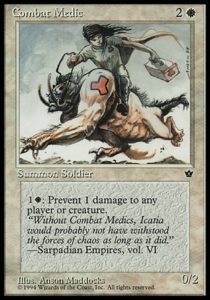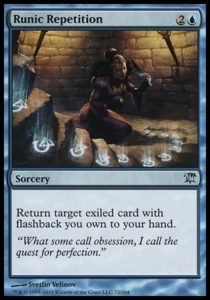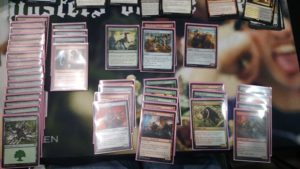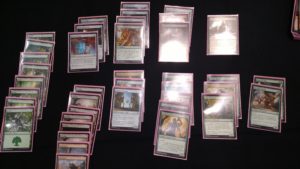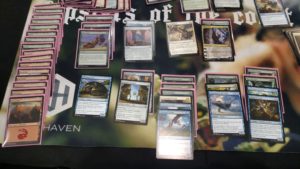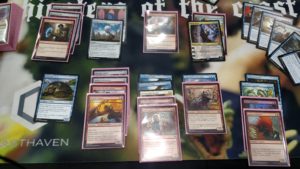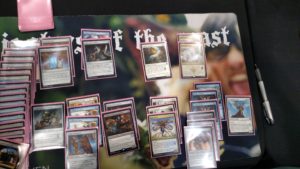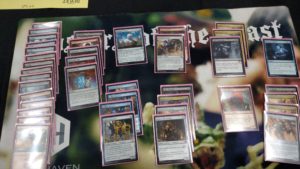Greetings, friends! Amonkhet spoiler season is underway, Modern Masters 2017 is in full, wonderful swing, and Aether Revolt is on its way out. This past weekend, many friends and I descended upon Orlando for the last non-team Grand Prix of the format. So, how’d it go?
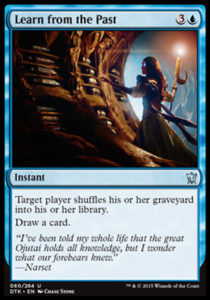
A non-tournament report tournament report
First and foremost, this isn’t a tournament report, at least not in the common sense. I rarely enjoy them. No disrespect for people who do, but I find recounting the entirety of a tournament to rarely be educational or interesting. I enjoy the authors whose reports single out the individual moments of greatest important, entertainment, or education.
So, I’m going to try and do just that, and I’ll be interspersing that story with the lessons I learned along the way.
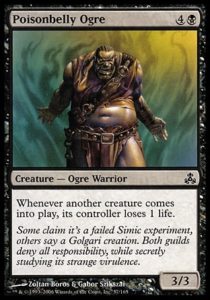
Blergh
So, what was most memorable about my tournament? That’s easy: food poisoning.
After a serviceable but unexciting 6-3 performance on day one and a nice night of food and drinks with friends, I returned to my hotel room feeling a bit queasy. By the time my roommate nodded off, I’d come down with food poisoning. I’m not sure if it was the convention center food, the rich dinner and drinks I’d had that night, or something else, but it kept me up and miserable until 4:30. When I managed to get some shuteye, my night wasn’t particularly restful—for no apparent reason whatsoever, someone somewhere near our hotel room was either playing bagpipies or playing a recording of them in the middle of the night. Please note: I didn’t imagine this in my fevered state, my roommate was also woken up by them and vividly remembered the same sound as I. Mystery bagpipe player of Orlando: wherefore dost thou play so early in the morn? So no, I didn’t sleep very well, even when I managed to stay in bed.
I awoke a little after 7:00, my brain a fried, sleep-deprived mess and my stomach no better. I was in no shape to play Magic, but I was awake with enough time to get ready. I showered, dressed, and ate the blandest thing I could find as slowly as I could.
Lesson #1: Portable Pharmacy
I’ve carried a small selection of remedies with me to tournaments for a few years now. Headaches at GPs are common (you’re staying indoors all day, constantly focusing, and likely not eating as well or exercising as much as you should be), so I’ve long since brought Advil along. However, I more recently upgraded my pack with amenities like Tums and Pepto-Bismol. Having those around made the difference between me getting a tiny bit of sleep and making it to the tournament, and me being miserable and giving up on returning on day two.
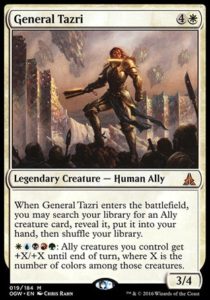
Lesson #2: It pays to have friends
Around four in the morning, I whined on Facebook about having food poisoning. I try not to complain much (particularly not on social media), but my ill humor pushed me over that hurdle. I awoke to an outporing of kind words, both from friends at the tournament who checked in on me and from those not in Orlando. My roommate, Rob, got me coffee and insisted I get bananas. Derek (who, along with me and the aforementioned Rob, comprised one of my favorite Team Draft League teams, but that’s another story) gave me nourishing food and some sort of electrolyte powder for my water. It was both physically helpful and deeply meaningful to have people watching out for me and sympathetic to my problems.
So yeah, having friends is great and going to a GP with them is great, particularly when things don’t go well.
Lesson #3: Practice makes perfect
I knew Aether Revolt pretty well going into the tournament. I usually dedicate myself to learning a format as soon as it comes out. By two months later, I’m usually bored with the format, and Aether Revolt was no exception. I’d practiced the format hard, but not in the weeks preceding the tournament. I’d moved on to thinking about Modern Masters and was only playing the format when I had to for Team Draft League.
Well, it turns out I’d practiced enough that all of the knowledge stuck with me. And even better, I didn’t have to consciously think about how to draft the format—which was particularly helpful, given that my brain was operating well below capacity. I was able to draft, read signals, and play my cards without having to think too hard.
This is a lesson that can either be inspiring or disappointing. You can build up mental muscle memory and rely on it (which is great), or you can argue that only so much practice is necessary (which is grounds for laziness).
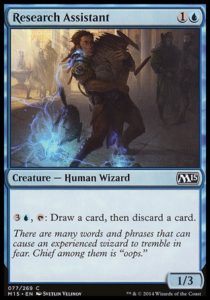
Lesson #4: Mistakes happen
The day started well for me. I drafted a deck with two copies each of [casthaven]Renegade Map[/casthaven], [casthaven]Sram’s Expertise[/casthaven], and [casthaven]Dark Intimations[/casthaven]. I went 2-1 in the first draft, losing in the finals to a nice opponent who cast [casthaven]Verdurous Gearhulk[/casthaven] on turn five both games. After beating me, he only needed one more win to become captain of team Puerto Rico—which I think he did. Congratulations!
In the second draft, I hilariously also had two copies of [casthaven]Renegade Map[/casthaven] and [casthaven]Dark Intimations[/casthaven] (people were too timid to go heavy multicolor in my draft pods, methinks). However, I was winding down. I was able to play my cards well enough, but I kept getting math wrong. I struggled to subtract life totals correctly after combat damage. I intermittently forgot [casthaven]Chief of the Foundry[/casthaven]’s buffs (leading my opponent to correct me when I put my 4/4 [casthaven]Foundry Assembler[/casthaven] in the graveyard when it only had three damage on it—which is the right thing to do, but obviously was not good for him.
I try hard to see mistakes as opportunities for learning, but on Sunday, I knew that there was little to learn from these mistakes. I was in miserable physical shape and these mistakes were going to happen. I could caffeinate, hydrate, and feed myself, but I couldn’t regain those lost hours of sleep or undo the nausea. I accepted that mistakes were simply the cost of me being there at all. I didn’t get hung up on them, because they were inevitable, but them ruining my focus or mood was preventable.
I did what I could to push through and play as well as I could. I 3-0ed the second draft, leaving me in 83rd place with an 11-4 record. This was a far, far better result than I expected when I woke up that morning, 6-3 and physically miserable.
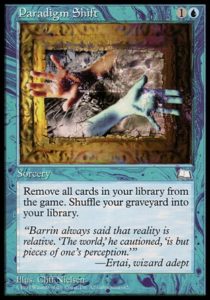
Lesson #5: Recognize that things change
Something was different among my friends. We’d stopped celebrating someone making day two and started expressing condolences to those unlucky few who didn’t. Somewhere along the way all of us had gotten a lot better at Magic. Sure, the inclusion of X-3 players on day two made it easier to make it, but I was the only person to squeak into day two not live for top eight. It was a cool moment to recognize how far we’d come (and still have to go—I want lots of us qualified for the Pro Tour). I recommend taking stock from time to time to appreciate the progress you’ve made or the hurdles you’ve left behind.
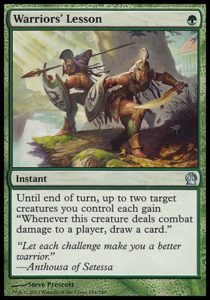
Lessons #6-10: GP fundamentals
I was able to function on day two with minimal brainpower because I’d internalized all of the following. If you’re interested in doing well at a Grand Prix, I recommend doing the following:
Build up stamina. Grand Prix are two intense days of Magic. It took attending a handful of GPs before I started feeling invigorated after eight hours of Magic, rather than exhausted. Streaming can also be a great way to build stamina, but it’s no substitute for going to an actual tournament.
Do timed drafts. Learning to do a timed draft while at a Grand Prix can be nerve-wracking. Fortunately, you can easily practice with nine people (eight to draft and one to call it). Figure out the way you most like to fan out cards for counting. Get used to not looking your picks except between packs. Have the situation be a familiar one, instead of a nerve-wracking one.
Don’t be too conservative. People get anxious when cash, pro points, and the Pro Tour are on the line. They commit too early to a color, try to force the ‘best’ archetype, or otherwise play it safe in a draft. Well, I did the opposite: in my first draft, I saw that people were avoiding white—the worst color, but not by too much—and changed directions hard. In both drafts, I made a point of wheeling [casthaven]Dark Intimations[/casthaven] because I was confident I was the only person excited to do the ‘risky’ thing and draft multicolor (risky is in quotes because I believe that, with enough [casthaven]Renegade Map[/casthaven]s, 3+ color is great) and both times, I was rewarded for it. This doesn’t mean you should go crazy at your next draft, just try to be aware of signals that other players are going to be conservative and if they are, capitalize on it.
Have a good attitude. At the end of the day, we all play Magic because we enjoy it. Tournaments can muddle this, because the allure and rush of winning can counterbalance the joy of playing the game. However, remember that you’re still there to have fun and, y’know, try to actually do that.
No one deserves to win. This is related to the previous lesson, but in a different context. Everyone is the hero of their own story—every victory is a triumph over adversity, and every loss is the bitter defeat at an adversary’s feet. It is this short-sighted (and usually unconscious) attitude that leads so many people to be ungracious in losing. At tournaments, I literally say to myself, aloud, “No one deserves to win” to remind myself that I am to be gracious in defeat and confident that I can theoretically win against any opponent (even a far more experienced and accomplished player than I).
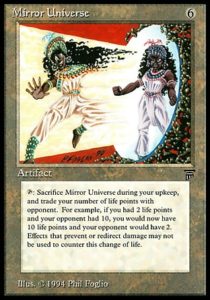
Phew! That’s all for this week. Next week it’ll be all Amonkhet, all the time. Until then, here’re the decks I played (or could have played, but didn’t) at Orlando. And, as always, thanks for reading!
—Zachary Barash
Zachary Barash is a New York City-based game designer. He’s played Magic since 1994, but went on a long hiatus, like many folks. He’s currently pursuing his MFA in Game Design at NYU and designing for Kingdom Death: Monster, a game that is most definitely not Magic.


